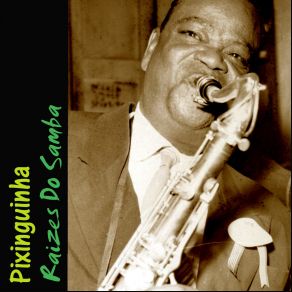Raizes Do Samba
Download links and information about Raizes Do Samba by Pixinguinha. This album was released in 2000 and it belongs to Samba, World Music, Latin genres. It contains 20 tracks with total duration of 01:01:27 minutes.

|
|
|---|---|
| Artist: | Pixinguinha |
| Release date: | 2000 |
| Genre: | Samba, World Music, Latin |
| Tracks: | 20 |
| Duration: | 01:01:27 |
| Buy it NOW at: | |
| Buy on iTunes $10.99 | |
| Buy on Amazon $8.99 | |
Tracks
[Edit]| No. | Title | Length |
|---|---|---|
| 1. | Batuque Na Cozinha | 3:22 |
| 2. | A Tua Sina | 2:11 |
| 3. | Cabide de Molambo | 3:26 |
| 4. | Roxa | 4:22 |
| 5. | Yaô | 2:33 |
| 6. | Mironga de Moça Branca | 1:48 |
| 7. | Que Que Re Que Que | 2:46 |
| 8. | Ai, Seu Pinguça | 2:19 |
| 9. | Estácio, Mangueira | 2:47 |
| 10. | Elizete No Chorinho | 1:50 |
| 11. | Os Oito Batutas | 2:31 |
| 12. | Fala Baixinho | 2:50 |
| 13. | Samba do Urubu | 5:17 |
| 14. | Odeon | 2:27 |
| 15. | 1X0 | 2:04 |
| 16. | Urubatan | 2:25 |
| 17. | De Mal Pra Pior | 2:22 |
| 18. | Samba Fúnebre | 2:31 |
| 19. | Carinhoso | 8:05 |
| 20. | Sofres Porque Queres | 3:31 |
Details
[Edit]A compilation of important recordings by Pixinguinha, a fundamental composer/arranger/instrumentalist and revolutionary of Brazilian music. Includes "Sofres Porque Queres," recorded in 1970. In that phase, Pixinguinha had already joined Benedito Lacerda's regional, recording albums in which he appears at the tenor sax counterpointing Lacerda's flute, but in this track, Pixinguinha plays the flute, accompanied by a violão. Benedito also is credited as co-author of this song and of many others, but Pixinguinha, following an old usage among poor musicians, used to give him partnership because of the excellent work of divulgation Lacerda did. "Batuque Na Cozinha," "A Tua Sina," "Cabide de Molambo," and other nine songs were taken from Pixinguinha's 1968 album Gente da Antiga (reissued here integrally), produced by Hermínio Bello de Carvalho for Odeon, reuniting old bambas like João da Baiana and Clementina de Jesus. They were just put together in the studio without any rehearsal, to play whatever pleased them, and the result was grand. "Samba do Urubu," "Odeon," "1 x 0," "Urubatan," "Carinhoso" (symphonic arrangement written by Pixinguinha in 1938 for the anniversary of the Radio Mayrink Veiga), "Samba Fúnebre," and "De Mal Pra Pior" (the latter two from the soundtrack of the film Sol Sobre a Lama) were taken from São Pixinguinha, the last album recorded by Pixinguinha, released by Odeon in 1971, with some tracks bringing an ugly fuzzed-out guitar which may have represented quite an achievement for the album's producer. This album was reissued integrally (which is not the case here) in CD format in the Os Originais series (EMI).